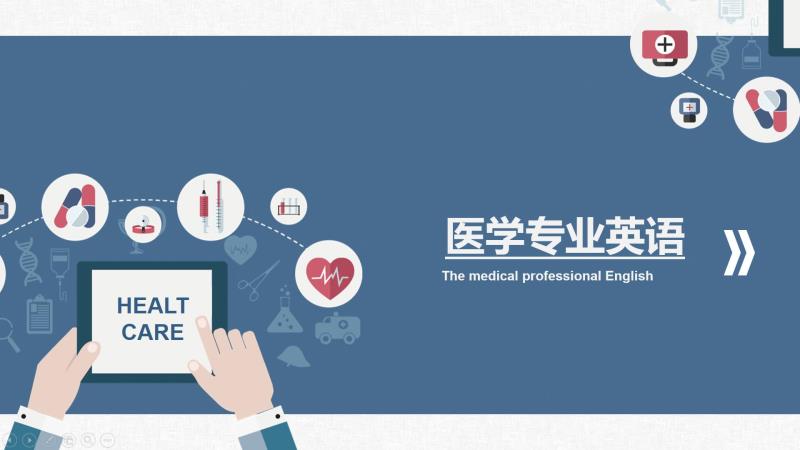
当前课程知识点:医学专业英语 > 2. Medical Literacy and Terminology (专业术语的构成和专有符号等) > Word-building(构词) > Video
Hello
大家好
我是中南大学外国语学院石海英
我们一起来学习医学术语
Medical terminology
Medical professionals have encountered the
great difficulties of learning the vast and
challenging language of medical terminology
Without adequate learning and teaching resources
it can be an overwhelming challenge
for medical English learners
The medical vocabulary is vast
learning it may seem like learning the
entire vocabulary of a foreign language
Moreover like the jargon that arises
in all changing fields
it is always expanding
So we offer this course
Medical Terminology
to meet the challenge
Welcome and thanks for the attendance
Now there are several parts
several units
There are units of my lecture
It’s divided into Unit 1 word-building
2 word analysis
and 3
the body and body parts
unit 4 about systems
the last unit is about pharmacology
Now we handle medical terminologies
from the understanding of Word Building
What is a word
A word is the smallest element that
may be uttered in isolation with semantic or pragmatic content
which means it can stand on its own
it can be said
and it is meaningful which makes sense
You see
a word is divided into simple words
derivatives
and compound word
Look at this sentence again
you’ll see some of the words are very simple
while some complicated
composed of more than two syllabuses
Now we look at the words
They are divided into simple words
derivatives 叫派生词and compound words
So derivatives and compound words
are composed of simple words and other things
these simple words and other things are called morpheme
What is a morpheme then
在中文叫做词素
morpheme is the smallest grammatical unit in a language
It can be words
it’s the smallest meaningful unit of language
It can be simple words
or even not words
just word parts
是单词的一个部分
word part
是单词的一个部分
所以
A morpheme is not identical to a word
and the principal difference between the two is that a word
by definition
is freestanding
whereas a morpheme may or may not stand alone
Look at these
Some are words
some are not
Word
simple word
simple word
This is a suffix
it’s not a word
it can not stand alone
它是不能够单独存在的
那么这个
cardio is also a morpheme
it’s not a simple word
Heart is a simple word
it can stand alone
Then
parts of the word
word parts
coming together to form a new word
We’ll see
safe
with an un-
prefix in front of
it comes unsafe
It’s a new word
And if we make it more complicated
弄得更复杂一点
拿一个
cardio
再加一个
pulmon
再加一个形容词的后缀
-ary
cardiopulmonary
就是表示心肺的
然后还有其他的词
cardio我们还可以加-ac
cardiac
是心脏的形容词
后面如果再加metabolic
cardiometabolic
to form a much longer
seemingly more complicated word
And then
these are the new words in the medical terminologies
we can find ways to divide them into smaller ones
In this way
it will be easier for us to remember them
to recite these words
So the word building
just like building blocks
其实就像堆积木一样
is to put morphemes together to form complicated
derivatives and compound word
which will be found in all medical documents long
complicated and difficult to remember
Morphemesor word parts
就是部分
单词的部分
可以会有root prefix and suffix
When we put these three blocks together
or two blocks
or more blocks together
we’ll find
have a new word
a new
long and complicated word
Most of medical terminologies are formed in this way
很多医学术语
基本上就是这样形成的
那么碰到又长又复杂又难记
又不会读的英语单词怎么办
我们还是把它拆开来
搞清楚每个部分的意思
这个意思就比较容易接受
然后你又能够根据每个部分的发音
找到它的重音
去读
去写
就容易多了
It’s not that complicated
We’ll have prefix
and suffix
then we take learn as an example
We learn something
put re- in front of it
relearn means to learn it again
Learn something
put –er after it
learner refers to someone who is learning
Now we take another medical terminology as an example
a very complicated one
you can see
that this is the stomach
and duodenum
What happened
had this part cut off
now we have this a procedure
called gastroduodenostomy
gastr/o- means stomach
duodeno means duodenum
-stomy means cut it off and then have them together
胃与十二指肠吻合术
This long word refers to a procedure
and you’ll find it difficult to pronounce
then cut it into three parts
and these three parts
we know how to pronounce gastro
we know how to pronounce duodeno
and we know how to pronounce ostomy
这个后缀呢
重音一般是倒数第三个音节
所以
gestroduodenostomy
And then
we get it
After that
we’ll come to more about the root because it’s the foundation
the most important part of a word
It decides the meaning of the word
root是词根
是最重要的一个部分
那么在医学英语术语当中
词根
mostly derived from Greek and Latin
mostly derived from Greek and Latin
For example you can see
it’s not like English
anyway
cardi is from Greek
And you’ll see kidney
有两个不同的词根
是因为有不同的词源
nephr comes from Greek
and ren comes from Latin
But they all mean kidney
It exists in English
in medical English
And then
one root with different meanings
another situation is one root with different meaning
For example like myel can mean bone marrow
and can also mean the spinal cord
scler means “hard” can also mean the white of the eye
cyst can mean a flled sac or pouch
it can also refer to the urinary bladder
And the third is about the compound word
words containing more than one root
两个词根以上的加在一起
就叫做复合词
We’ll have eyeball
bedpan
frostbite
wheelchair
lymphocyte
lymph
cyte
淋巴细胞
lymphocyte
Combining forms
we also need to know
is the combining vowel
and the combining consonant
We’ll talk about combining consonant later
That’s rare cases
but combining vowel we’ll encounter this most often
When a root and suffix
then sometime we need a o in front of it
一般来说
词根是辅音结尾
后缀是辅音开头
这个时候
就会加上一个用于连接的元音
使这个单词能够读得出来
那我们在写的时候就会写成
the study of the nervous system
neurology
encephalopathy
这个o和这个o都是叫做combining forms
除了o之外还有其他的元音
一般来说o是最常见的combining vowel
root加o
这个就叫做combining forms
叫做构词的形式
比方说neuro
你会发现有两种写法
一种是用斜杠把这个o隔开来
明确地告诉你这个是combining vowel
前者就直接就把它当成一个词根了
这两种写法都可以的
不过我还是倾向于用后者
因为除了o之外还有其他的连接的元音
如果用前面的方式去记忆的话
万一它后面改了另外一个元音来连接
就有可能记不住
搞不清楚
the ending beginning with a vowel
但是如果后面接的后缀开始是一个元音
比方说neur
后面是接的-itis
-itis是表示炎症
变成neuritis
这个时候就不需要这个o在这里凑数
就直接用neuritis
直接放在一起了
It’s the inflammation of a nerve
有一些非常常见的
我们可以用各种写的方式把它写出来
像这种combining vowel
表示心脏或者心脏的
Another example is coccyx
这个是尾椎
The coccyx of the spine looks like the bill of a cuckoo
因为嘴巴长得像cuckoo的鸟嘴
所以就给它起名叫尾椎骨叫coccyx
You can also find the origin of the word in a dictionary
Now there is a website recommended here
In this website
you can find the word building
many of the medical terminologies
not all
but many of the medical terminologies
It can tell you how this word was created
how it came into being and how it has become the one like today
This is a very good website
highly recommended
I have given you the brief introduction of word building
We’ll move on to word analysis next unit
And that will be all today
thank you
今天我们就到这里
下次再见
-Medicine,Language,English(英语在医学实践中的地位和应用特点)
-Medical English: features and learning strategies(医学专业英语的学习策略和方法)
--Video
-学习资源
-第一章 Medical English: Features and Learnin
-Word-building(构词)
--Video
-Word Analysis (prefixes and suffixes)(单词分析(前缀和后缀))
--Video
-The body and body parts
--Video
-Systems(系统)
--Video
-Pharmacology(药理)
--Video
-Etymology for medical terms (医学词语词源学的研究)
--Video
-Symbols and abbreviations in medical language(医学实用缩略语和常用医学符号)
--Video
-术语学习——访谈
--Video
-2.Medical Literacy and Terminology (专业术语
-Top-down skill in readings:frame and process(从整体到细节的阅读策略分析)
--Video
-Inferring and referring in reading process(推断和归纳在专业阅读中的运用)
--Video
-Making notes in your learnings(学会做学习的笔记)
--Video
-Making use of reading skills in your life (阅读的类型和技巧介绍)
--Video
-批判性思维——访谈
--Video
-学习资源
--学习资源
-Critical Reading Skills
-Reading Skills for Professional Medical Literature(医学专业文献的语言特点和阅读)
--Video
-Reading skills for paragraphs in Medical Papers(医学论文的段落写作特点和阅读)
--Video
-Reading skills for Articles and Medical Journals(医学专业论文的基本阅读技巧)
--Video
-科技类文献阅读
--Video
-Reading Skills for Medical Teaching Materials(医学专业教材的语言特点和阅读)
--Video
-医学专业文献阅读——访谈
--Video
-学习资源
--html
--html
-4.基础练习1
-4.基础练习2
-4.基础练习3
-Strategies and Techniques in Doctor-patient communicatin 1(医患沟通的策略与技巧 1)
--Video
-Strategies and Techniques in Doctor-patient communicatin 2(医患沟通的策略与技巧 2)
--Video
-Strategies and Techniques in Doctor-patient communicatin 3(医患沟通的策略与技巧 3)
--Video
-Strategies and Techniques in Doctor-patient communicatin 4(医患沟通的策略与技巧 4)
--Video
-Strategies and Techniques in Doctor-patient communicatin 5(医患沟通的策略与技巧 5)
--Video
-Strategies and Techniques in Doctor-patient communicatin 6(医患沟通的策略与技巧 6)
--Video
-Doctor‐patient Communication——访谈
--Video
-5.Communication in Clinic Medicines (医学临
-Medical translation practice: from English to Chinese(医学英语汉译实用策略分析)
--Video
-Translation of traditional Chinese medical literature to English(医学文献的中译英问题研究)
--Video
-Balance and features of Chinese and English cultures in medical communication(医学交流中汉、英语言文化特点的比较分析)
--Video
-Principles and approaches:medical translation(翻译问题: 基本原则和方法)
--Video
-翻译——访谈
--Video
-6.Balance Between Chinese and English: M
-Case History writing(案例历史写作)
--Video
-应用文写作——访谈
--Video
-学习资源
--学习资源
-general introduction to academic writing(学术写作的一般介绍)
--Video
-Proposal writing(提案写作)
--Video
-Abstract writing(摘要写作)
--Video
-The path and features of Medical academic writting 1(医学论文写作的路径和特点介绍 1)
--Video
-Writing of medical literature reviews(医学文献综述的写作)
--Video
-学术写作——访谈
--Video
-写作与学术写作
-communication and Medical Study(交流和医学研究)
--Video
-Attending Professional Medical Conferences(如何参加国际会议)
--Video
-Presenting in Professional Medical Conferences(在国际专业医学会议上的展示问题)
--Video
-Attending An Academic Conference——访谈
--Video
-9.communication and Medical Study--基础训练




